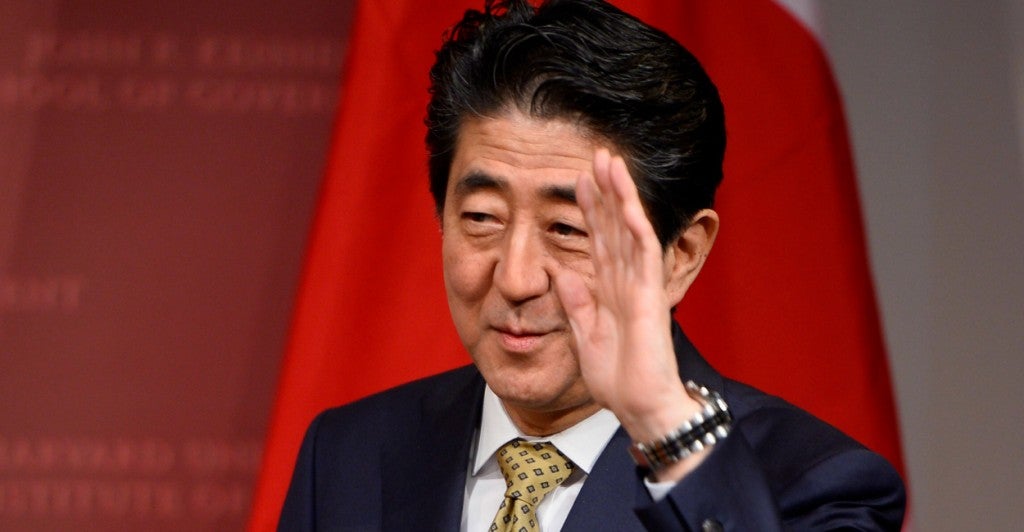Japanese Prime Minister Shinzo Abe hit the ball out of the park during his trip to America, but stumbled while rounding third base.
Whether one highlights the success or shortcoming reflects the assessor’s focus either on the present or on Japan’s past. While most attention was focused on Abe’s historic speech to a joint meeting of Congress—the first by a Japanese prime minister—the overall trip allowed him to highlight Tokyo’s security and economic importance.
The biggest deliverable was the release of new bilateral Guidelines for Defense Cooperation on the eve of Abe’s visit to Washington. The agreement institutes sweeping changes to the existing 1997 guidelines, enabling greater synergistic and integrated alliance security operations worldwide.
The announcement is a major accomplishment for the alliance and the result of Washington’s decades-long effort to get Japan to play a larger role in addressing international security challenges.
Since 1945, Japanese Self-Defense Forces have been constrained by constitutional, legislative and budgetary restrictions. Tokyo also eschewed exercising collective self-defense—the ability to defend the forces of another country—a right guaranteed to all nations under the U.N. Charter. As a result, Japan was precluded, for example, from protecting U.S. forces deployed to defend Japan or even transporting American bullets on Japanese ships.
The 1997 alliance guidelines were hopelessly archaic for dealing with today’s evolving and deteriorating security environment. Tokyo limiting itself to providing rear area logistical support to U.S. forces only near Japan was outdated in light of North Korea’s growing nuclear and missile capabilities as well as new threats such as cyber warfare and the militarization of space. Japanese security roles, missions and capabilities have also evolved since 1997, with the Self-Defense Forces gradually expanding into new areas.
Though the U.S. and Japan were unable to reach bilateral agreement on key issues to enable Japan to resolve their differences over the terms of the Trans-Pacific Partnership. However, officials from both sides privately report behind the scenes progress generating optimism for near-term success.
A key, if not sole, focus for South Korea and some in the U.S., however, was how Abe treated sensitive historic issues generated by Japan’s aggressive behavior in the 20th century.
While upholding the important Kono and Murayama statements of preceding administrations, Abe has questioned the evidence of Japanese government involvement in procuring sexual slaves during World War II and seemingly backtracked on acknowledging Tokyo’s wartime guilt.
Abe’s Congressional speech provided a Rorschach test for his views on Japan’s past. He commented on his visit to the World War II memorial, highlighting the battles of Pearl Harbor, Bataan, Corregidor and the Coral Sea.
The prime minister expressed “eternal condolences” and “deep repentance” for the “lost dreams and lost futures of those young Americans.”
Abe expressed deep remorse, as he has in previous venues, acknowledged “our actions brought suffering to the peoples of Asia, and vowed again to “uphold the views expressed by the previous prime ministers.”
The prime minister’s remarks appear to go further than has previously done in accepting responsibility for Japan’s wartime past, a positive and significant—though still limited—step towards the broader contrition that Abe must express if he hopes to put the past behind him.
He did not use important phrases from the Kono and Murayama statements nor did he use the word “apologize”—critical requirements to ensure reconciliation with Seoul.
South Korean and Chinese official and media criticism was expected and, to some degree, reflects unrealistic expectations for the trip. It was unlikely that, during a U.S. trip, Abe was going to dwell on issues outside the bilateral relationship.
The ball remains in Abe’s court as to how willing he is to make amends for Japan’s past in order to facilitate reconciliation with South Korea. But Seoul also has responsibility for identifying specific steps that Tokyo could take that would enable South Korea to similarly try to move beyond a sometime myopic focus on the past.
Abe’s U.S. trip was successful in underscoring Japan’s current importance and providing a cogent vision of how his country can contribute even more broadly on addressing future challenges. But to embrace his country’s bright future and maximize Japan’s value as an American security ally, Japan and South Korea must resolve their differences. Abe’s leadership is necessary to make that happen.
